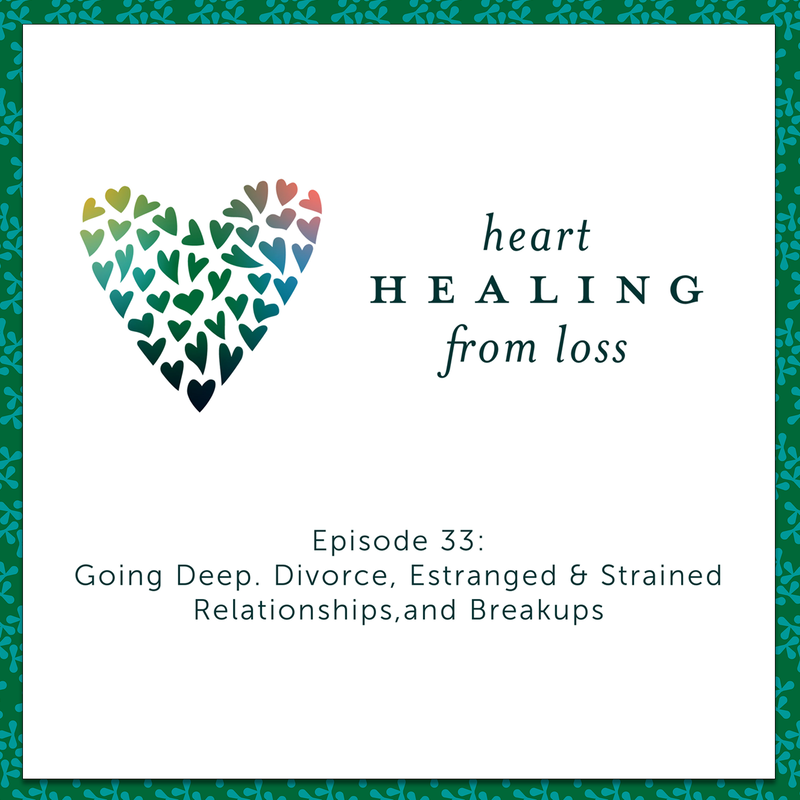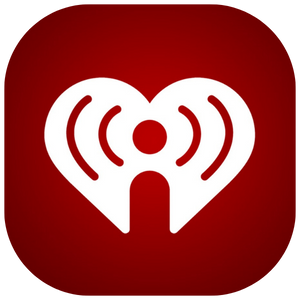Episode 33: Going Deep. Divorce, Estranged & Strained Relationships, & Breakups
|
Ending Relationships
The grief around ending a relationship may not be about losing the person, it can also include disappointment from the loss of dreams, hopes, and expectations. There’s nothing wrong with feeling sad about that loss as well, but not understanding the roots of feelings of grief can make it harder to move on. Let's Take a Deep Dive In this episode, Advanced Grief Recovery Specialist Wendy Sloneker talks about the elements of grief that can come from relationships that are strained or over, and how taking a deep dive into the mechanics of that relationship can help the healing. |
You are Invited:
See what resonates with you, then find some help and healing of your own in a complimentary session with Wendy. You can schedule time with her at HeartHealingFromLoss.com.
See what resonates with you, then find some help and healing of your own in a complimentary session with Wendy. You can schedule time with her at HeartHealingFromLoss.com.
As seen on: |
|
Full Episode Transcript
Wendy Sloneker
You are listening to the Heart Healing from Loss podcast episode 33.
Hi, everyone, and welcome back, Hey, today we're gonna go a little deeper on a core component around grief and loss inside of or stemming from divorce, strained, and or estranged relationships, and also a little bit about breakups.
Now, I know that this can be a wide, wide topic. And I really want to just unpack a couple of simple things to examine around grief and feelings of loss around these topics. Now, they're big because it's relationships. And relationships are commonly a big focus in our society and culture. Also with ourselves, right? So like, oh, yeah, our identity stems a lot from the relationships we're in the ones we choose the ones we get out of all of the things. When we get together with somebody, say, in a marriage, our identity changes to include the role of spouse or partner or any other topic, wife, husband, any of those, so the identity can change.
Even when we start dating someone, sometimes there's a conversation about, hey, does that mean we're dating? Can I call you my girlfriend? Can I call you my boyfriend? Can I call you, my lover? The identity changes as the relationship changes. So I want to talk a little bit about some common themes that you can examine just around your own feelings of loss. Should you have any? And you know, chances are good you do because you're listening to a grief podcast.
So here's where we are. I want to talk a little bit about hopes, dreams and expectations. Now, these started back back back when? Well, I don't know exactly when, because it's different for every relationship, when I was really little. And I was thinking about and playing with my friends around like, growing up and playing house, that sort of thing. Those sorts of things turned me on to oh, what's it going to be like, when I'm grown up? What's it going to be like when I'm a teenager and starting to date, my brain was still developing. So it wasn't all that concrete. However, this is where hopes dreams and expectations kind of started. And they may have started for you in these ways as well. So I would love it, if you would consider just Hey, when did I start thinking about becoming a partner or becoming a lover, or having my first experiences around whatever it is becoming a grandmother, grandparent, because hopes dreams and expectations, like again, relationships, right, we create them, we become them. These are lived experiences. We don't become the relationship we experienced the relationship and have a lived experience in a new role that informs and enriches our identity, even the painful ones. Ah, it enriches you can totally take that or leave it.
I am from the approach that every experience in life on this planet for me, is going to enrich my experience. Yep, still, even the painful ones. So hopes, dreams and expectations of becoming married or partnered, or any of those things. This is this starts young, like the the short answer here or the short topic suggestion here is it goes way back. It's not about the actual person that you're either married to and divorcing from or that you've broken up with, or that you're having a season of non communication with strained or a strange relationship.
This has to do with how we wished and hoped it would be from our formative years, how we started imagining it would be and what we wanted. Now another component is around something else that we've brought up a few times on this podcast and that is the concept of different better or more and this also may relate to how once in these relationships, we wanted different or better or more on the outside of a divorce when separations happened, or you haven't been talking for a while, or the breakup happened a while ago, you may have wanted different or better or more.
And this is where we as humans, with our human brains, we can get into an on repeat scenario. And sometimes it can look like they should have they didn't. They always they never. What are you noticing, it's all about they and we have no personal power when we wait for or expect it all to come from something else. So we actually place blame or find fault with another person, the one that we perhaps fell in love with, wanted to be with, like, our feelings changed, because our thoughts became somehow different based on experience. And I'm not going to quibble or argue this is not a place this is I would like you to try on.
When did you want different or better or more in a specific relationship, you can try and on with however many you got. But different better or more can be things that can be aspirational, or we can find blame or fault. And so one thing that comes to mind is they should know, like, I've told them a million times, and they should know, they should just know.
And what this is, is a way to justify and continue to blame. I'm not saying that wasn't problematic. What I'm saying is, there's no winning for you or no sense of completion, because there's still a sense of waiting, they should, they should just know. So that expectation is where pain can come in. Because maybe they still didn't know, maybe their brains were on fire for some reason that had nothing to do with you or your relationship. And for whatever reason, it wasn't the way that you thought it would be, and therefore the way you thought it should be.
Whoa, yeah, this happens all the time. And so as we're getting curious, and as we're exploring these core pieces of hopes, dreams and expectations that started long, long time ago, before he ever met the person at hand or at heart, that, you know, you're dealing with difficult again, we're talking about grief of a loss of a dream.
We're talking about a sense of loss around those hopes that you wanted, from a long time ago that you started planning, what without the person even being there, that is not wrong, by the way. That is how we do it as humans. We are given examples of many kinds as children, what to do, what not to do, what we like, what we prefer, what we don't like, what feels right, what seems like love what feels like love what we're taught about love, that may or may not actually work for us, as grown up, folks. Right?
So coming into an exploration of these kinds of things that stem from way back before you ever met the person, or that person ever came into your life can be just part of what is lost, or what is being grieved. I always thought it would be this way. I always wanted this. And this is this is actually natural.
This is part of what we've lost. Didn't it didn't work out that way. Or it didn't. It didn't last that way. And this is another human experience. Painful. I'm not gonna argue with that. I'm not gonna say it's not. And as a human person on the planet for a short period of time, this relationship continues to enrich based on the thoughts we think about it. That's a big one. You can totally replay that. I don't know if I could even restate that.
So I want to talk a little bit about how dating is different. I'm figuring that you're understanding
And around divorce and hopes, dreams and expectations. And I want to share a couple of words around how dating is different. Because there are some things that are the same. And there are some that are different.
I was talking with somebody recently who has been out of a marriage for a few years now and has begun dating. And is I'm going to say this, I'm not going to share the age because the age doesn't matter. What I am going to say is this person feels like they should already have this quote, all worked out. Unquote. They've they were in love with the person that they were previously married with. And then they got divorced, and now they're dating again. Okay. And they have this thought of, Am I ever going to find a love that lasts? Am I ever going to this this? Can anybody relate? I certainly can't. Based on previous experiences.
Now, I don't know exactly how this client feels. Because I don't have the hopes, dreams and expectations or the wants for different or better or more that this person has. This is how unique it is when we go through life. And we go through relationships. And we have experiences that we have, we just have the ones that we have. They are not universal, they're 100%, unique and individual. So when it comes to the thought of am I ever, which is actually a question, it's not a statement, am I ever going to have this figured out or worked out?
What I try to share with my clients is, hey, that is a very painful prospect. Because the implicit idea is, once something's wrong, too, I might be doing it wrong. And three, it's never gonna happen. Like the actual premise of, it's never going to happen the way that I want it to, or how I dream about it is never going to happen.
How, number one, and two, like this is problematic, because it sets us up for a cycle of common thinking. And sometimes we really want to have these thoughts that don't feel great. Want to have the feelings of you know, I'm in pain, I am no stranger to my own pity parties around these kinds of thoughts and feelings. This is natural and normal part of our process.
And when it's time when you feel tired of that circle of that loop of thoughts of am I ever gonna get it right? What's wrong with me? They're not the ones blabbity blah, it is hard to motivate yourself with gentleness out of that kind of thought loop. So I want to offer that something else that you can do, which is kind of like an assessment when a dating a person ends.
Okay, so there's a breakup, or, you know, you've been dating for a little while and haven't actually gotten to, you know, a new role or some sort of dating agreement, you just sort of seeing each other for a little bit. And you decide, hey, I think I'm done. I have enough information. Thank you so much, I'm gonna move on and go to another person or take a break from dating or whatever it is. Thank you so much. Let's discontinue seeing each other. I don't know how they say it these days. In dating, I've been married for more than 10 years. So I'm not exactly sure how the practical like word at your thing happens. But here's the decision. No longer seeing each other or dating.
Okay. So here's what I want to offer the assessment. Because if you're still sort of seeking and searching for, quote, The One, you still may end up like needing to meet and explore and experience a few other people before you get to the one. I don't know how long it's gonna take. I don't know where those people are. I have no idea and you know, chances are good and neither do you. So here's what you can do, gently conduct an assessment.
And this is something like it sounds very clinical. It sounds very linear. What it actually is, is data driven based on your experience. So we're looking for here's where we we put on our either lab coat or we get out our Sherlock Holmes hat. Okay. Your choice either one. Hey, try both Who am I to? You know, say? It sounds kind of good actually lab coat and Sherlock Holmes hat, plus magnifying glass, and microscope.
Here we go. Here's the three questions. What worked? What did I love about meeting this person experiencing this person? For the time that we did even if it was just one date, or one afternoon or one? Zoom call? Or what did I love about this? What worked about this? Feel free to get as granular and as tiny as you'd like? Like, I just really liked that I did it. Excellent. equals this counts?
Two, Yes, valid answer to what did not work for me about this experience. What I noticed this person, what were my other feelings of maybe discomfort or flags? Or what did I notice that maybe I was sending up a little bit of an alert about or unsure about or discomfort, discomforted or uncomfortable with? Valid answers, just let your answers be your answers. This is not have time to overthink it. If I didn't say so earlier, and I think I did not. This is also a good time to get it down on paper. So you can see it. Because lots going on in your brain that's like on repeat, getting it out onto paper is going to stop that loop. And it's also going to give you a new fresh angle to look at it.
Three, what am I doing different next time that I can do that's in your control that's in your wheelhouse that you're willing to do that sounds interesting that you might explore that you've never done before, on your way. And the way that you talk to yourself, while you're going through this is also important. Look at me, I'm assessing. This is pretty like advanced in terms of thoughts and feelings management.
Only because it is I would love it if you would practice that. And you can practice that in every relationship. This is often what I do with every single client that I work with is like let's just take another look.
And here's another one. I know I said three, but I'm adding one just consider this a bonus. I've mentioned it before. But here's the application. What did I want to be different or better or more. And if you can, for extra extra bonus, you know, even just thinking it to yourself.
What were my hopes, dreams and expectations around this relationship. It's important and it's really informative. This is also where you can gather information about what else happened, what else happened? And then what else happened?
Grief and Loss are not linear. But being with yourself in an explorative exploitative, in a way that explores is how it's just part of processing is how we stay present with ourselves. It's how we continue to show up. It's how we heal. And it's how we walk ourselves through each and every next experience each and every moment. Each and every this right now experience.
So if divorce has happened, or you're in a strained or estranged relationship, or if you've experienced a breakup, and any of this is resonant, resonating. Consider that assessment on paper. It's not for anybody else's eyes. You're not doing anything wrong. It's not possible. Not really possible. You're following your path and you are exploring and showing up as you are willing and able a little bit better every time.
Thank you for joining me today. I'm thinking of you. And when you're ready, reach out for a connection call more on that right now.
Thanks, everybody.
I'll see you in the next I'll talk to you in the next episode. Heck, yes, I will. Okay, bye.
Hi, it's Wendy. Thank you so much for listening. If something resonated or stuck out or sort of hummed with you in this episode, and you want to either talk more about it, or have me talk more about it, let's schedule a connection call. It could be that you are ready to learn how to release emotional pain. That sounds great. It's great to do and it's great on the other side regardless, you're invited. So if you think it's time for a free 30 minute connection call. I would love to have that with you.
Go to Wendy at HeartHealingfromLoss.com to email and schedule, or you can text or call 206-498-8025 and schedule it that way. I would love to talk with you and I would love to listen to you too. Thank you and thanks for coming back for the next episode too.
You are listening to the Heart Healing from Loss podcast episode 33.
Hi, everyone, and welcome back, Hey, today we're gonna go a little deeper on a core component around grief and loss inside of or stemming from divorce, strained, and or estranged relationships, and also a little bit about breakups.
Now, I know that this can be a wide, wide topic. And I really want to just unpack a couple of simple things to examine around grief and feelings of loss around these topics. Now, they're big because it's relationships. And relationships are commonly a big focus in our society and culture. Also with ourselves, right? So like, oh, yeah, our identity stems a lot from the relationships we're in the ones we choose the ones we get out of all of the things. When we get together with somebody, say, in a marriage, our identity changes to include the role of spouse or partner or any other topic, wife, husband, any of those, so the identity can change.
Even when we start dating someone, sometimes there's a conversation about, hey, does that mean we're dating? Can I call you my girlfriend? Can I call you my boyfriend? Can I call you, my lover? The identity changes as the relationship changes. So I want to talk a little bit about some common themes that you can examine just around your own feelings of loss. Should you have any? And you know, chances are good you do because you're listening to a grief podcast.
So here's where we are. I want to talk a little bit about hopes, dreams and expectations. Now, these started back back back when? Well, I don't know exactly when, because it's different for every relationship, when I was really little. And I was thinking about and playing with my friends around like, growing up and playing house, that sort of thing. Those sorts of things turned me on to oh, what's it going to be like, when I'm grown up? What's it going to be like when I'm a teenager and starting to date, my brain was still developing. So it wasn't all that concrete. However, this is where hopes dreams and expectations kind of started. And they may have started for you in these ways as well. So I would love it, if you would consider just Hey, when did I start thinking about becoming a partner or becoming a lover, or having my first experiences around whatever it is becoming a grandmother, grandparent, because hopes dreams and expectations, like again, relationships, right, we create them, we become them. These are lived experiences. We don't become the relationship we experienced the relationship and have a lived experience in a new role that informs and enriches our identity, even the painful ones. Ah, it enriches you can totally take that or leave it.
I am from the approach that every experience in life on this planet for me, is going to enrich my experience. Yep, still, even the painful ones. So hopes, dreams and expectations of becoming married or partnered, or any of those things. This is this starts young, like the the short answer here or the short topic suggestion here is it goes way back. It's not about the actual person that you're either married to and divorcing from or that you've broken up with, or that you're having a season of non communication with strained or a strange relationship.
This has to do with how we wished and hoped it would be from our formative years, how we started imagining it would be and what we wanted. Now another component is around something else that we've brought up a few times on this podcast and that is the concept of different better or more and this also may relate to how once in these relationships, we wanted different or better or more on the outside of a divorce when separations happened, or you haven't been talking for a while, or the breakup happened a while ago, you may have wanted different or better or more.
And this is where we as humans, with our human brains, we can get into an on repeat scenario. And sometimes it can look like they should have they didn't. They always they never. What are you noticing, it's all about they and we have no personal power when we wait for or expect it all to come from something else. So we actually place blame or find fault with another person, the one that we perhaps fell in love with, wanted to be with, like, our feelings changed, because our thoughts became somehow different based on experience. And I'm not going to quibble or argue this is not a place this is I would like you to try on.
When did you want different or better or more in a specific relationship, you can try and on with however many you got. But different better or more can be things that can be aspirational, or we can find blame or fault. And so one thing that comes to mind is they should know, like, I've told them a million times, and they should know, they should just know.
And what this is, is a way to justify and continue to blame. I'm not saying that wasn't problematic. What I'm saying is, there's no winning for you or no sense of completion, because there's still a sense of waiting, they should, they should just know. So that expectation is where pain can come in. Because maybe they still didn't know, maybe their brains were on fire for some reason that had nothing to do with you or your relationship. And for whatever reason, it wasn't the way that you thought it would be, and therefore the way you thought it should be.
Whoa, yeah, this happens all the time. And so as we're getting curious, and as we're exploring these core pieces of hopes, dreams and expectations that started long, long time ago, before he ever met the person at hand or at heart, that, you know, you're dealing with difficult again, we're talking about grief of a loss of a dream.
We're talking about a sense of loss around those hopes that you wanted, from a long time ago that you started planning, what without the person even being there, that is not wrong, by the way. That is how we do it as humans. We are given examples of many kinds as children, what to do, what not to do, what we like, what we prefer, what we don't like, what feels right, what seems like love what feels like love what we're taught about love, that may or may not actually work for us, as grown up, folks. Right?
So coming into an exploration of these kinds of things that stem from way back before you ever met the person, or that person ever came into your life can be just part of what is lost, or what is being grieved. I always thought it would be this way. I always wanted this. And this is this is actually natural.
This is part of what we've lost. Didn't it didn't work out that way. Or it didn't. It didn't last that way. And this is another human experience. Painful. I'm not gonna argue with that. I'm not gonna say it's not. And as a human person on the planet for a short period of time, this relationship continues to enrich based on the thoughts we think about it. That's a big one. You can totally replay that. I don't know if I could even restate that.
So I want to talk a little bit about how dating is different. I'm figuring that you're understanding
And around divorce and hopes, dreams and expectations. And I want to share a couple of words around how dating is different. Because there are some things that are the same. And there are some that are different.
I was talking with somebody recently who has been out of a marriage for a few years now and has begun dating. And is I'm going to say this, I'm not going to share the age because the age doesn't matter. What I am going to say is this person feels like they should already have this quote, all worked out. Unquote. They've they were in love with the person that they were previously married with. And then they got divorced, and now they're dating again. Okay. And they have this thought of, Am I ever going to find a love that lasts? Am I ever going to this this? Can anybody relate? I certainly can't. Based on previous experiences.
Now, I don't know exactly how this client feels. Because I don't have the hopes, dreams and expectations or the wants for different or better or more that this person has. This is how unique it is when we go through life. And we go through relationships. And we have experiences that we have, we just have the ones that we have. They are not universal, they're 100%, unique and individual. So when it comes to the thought of am I ever, which is actually a question, it's not a statement, am I ever going to have this figured out or worked out?
What I try to share with my clients is, hey, that is a very painful prospect. Because the implicit idea is, once something's wrong, too, I might be doing it wrong. And three, it's never gonna happen. Like the actual premise of, it's never going to happen the way that I want it to, or how I dream about it is never going to happen.
How, number one, and two, like this is problematic, because it sets us up for a cycle of common thinking. And sometimes we really want to have these thoughts that don't feel great. Want to have the feelings of you know, I'm in pain, I am no stranger to my own pity parties around these kinds of thoughts and feelings. This is natural and normal part of our process.
And when it's time when you feel tired of that circle of that loop of thoughts of am I ever gonna get it right? What's wrong with me? They're not the ones blabbity blah, it is hard to motivate yourself with gentleness out of that kind of thought loop. So I want to offer that something else that you can do, which is kind of like an assessment when a dating a person ends.
Okay, so there's a breakup, or, you know, you've been dating for a little while and haven't actually gotten to, you know, a new role or some sort of dating agreement, you just sort of seeing each other for a little bit. And you decide, hey, I think I'm done. I have enough information. Thank you so much, I'm gonna move on and go to another person or take a break from dating or whatever it is. Thank you so much. Let's discontinue seeing each other. I don't know how they say it these days. In dating, I've been married for more than 10 years. So I'm not exactly sure how the practical like word at your thing happens. But here's the decision. No longer seeing each other or dating.
Okay. So here's what I want to offer the assessment. Because if you're still sort of seeking and searching for, quote, The One, you still may end up like needing to meet and explore and experience a few other people before you get to the one. I don't know how long it's gonna take. I don't know where those people are. I have no idea and you know, chances are good and neither do you. So here's what you can do, gently conduct an assessment.
And this is something like it sounds very clinical. It sounds very linear. What it actually is, is data driven based on your experience. So we're looking for here's where we we put on our either lab coat or we get out our Sherlock Holmes hat. Okay. Your choice either one. Hey, try both Who am I to? You know, say? It sounds kind of good actually lab coat and Sherlock Holmes hat, plus magnifying glass, and microscope.
Here we go. Here's the three questions. What worked? What did I love about meeting this person experiencing this person? For the time that we did even if it was just one date, or one afternoon or one? Zoom call? Or what did I love about this? What worked about this? Feel free to get as granular and as tiny as you'd like? Like, I just really liked that I did it. Excellent. equals this counts?
Two, Yes, valid answer to what did not work for me about this experience. What I noticed this person, what were my other feelings of maybe discomfort or flags? Or what did I notice that maybe I was sending up a little bit of an alert about or unsure about or discomfort, discomforted or uncomfortable with? Valid answers, just let your answers be your answers. This is not have time to overthink it. If I didn't say so earlier, and I think I did not. This is also a good time to get it down on paper. So you can see it. Because lots going on in your brain that's like on repeat, getting it out onto paper is going to stop that loop. And it's also going to give you a new fresh angle to look at it.
Three, what am I doing different next time that I can do that's in your control that's in your wheelhouse that you're willing to do that sounds interesting that you might explore that you've never done before, on your way. And the way that you talk to yourself, while you're going through this is also important. Look at me, I'm assessing. This is pretty like advanced in terms of thoughts and feelings management.
Only because it is I would love it if you would practice that. And you can practice that in every relationship. This is often what I do with every single client that I work with is like let's just take another look.
And here's another one. I know I said three, but I'm adding one just consider this a bonus. I've mentioned it before. But here's the application. What did I want to be different or better or more. And if you can, for extra extra bonus, you know, even just thinking it to yourself.
What were my hopes, dreams and expectations around this relationship. It's important and it's really informative. This is also where you can gather information about what else happened, what else happened? And then what else happened?
Grief and Loss are not linear. But being with yourself in an explorative exploitative, in a way that explores is how it's just part of processing is how we stay present with ourselves. It's how we continue to show up. It's how we heal. And it's how we walk ourselves through each and every next experience each and every moment. Each and every this right now experience.
So if divorce has happened, or you're in a strained or estranged relationship, or if you've experienced a breakup, and any of this is resonant, resonating. Consider that assessment on paper. It's not for anybody else's eyes. You're not doing anything wrong. It's not possible. Not really possible. You're following your path and you are exploring and showing up as you are willing and able a little bit better every time.
Thank you for joining me today. I'm thinking of you. And when you're ready, reach out for a connection call more on that right now.
Thanks, everybody.
I'll see you in the next I'll talk to you in the next episode. Heck, yes, I will. Okay, bye.
Hi, it's Wendy. Thank you so much for listening. If something resonated or stuck out or sort of hummed with you in this episode, and you want to either talk more about it, or have me talk more about it, let's schedule a connection call. It could be that you are ready to learn how to release emotional pain. That sounds great. It's great to do and it's great on the other side regardless, you're invited. So if you think it's time for a free 30 minute connection call. I would love to have that with you.
Go to Wendy at HeartHealingfromLoss.com to email and schedule, or you can text or call 206-498-8025 and schedule it that way. I would love to talk with you and I would love to listen to you too. Thank you and thanks for coming back for the next episode too.






